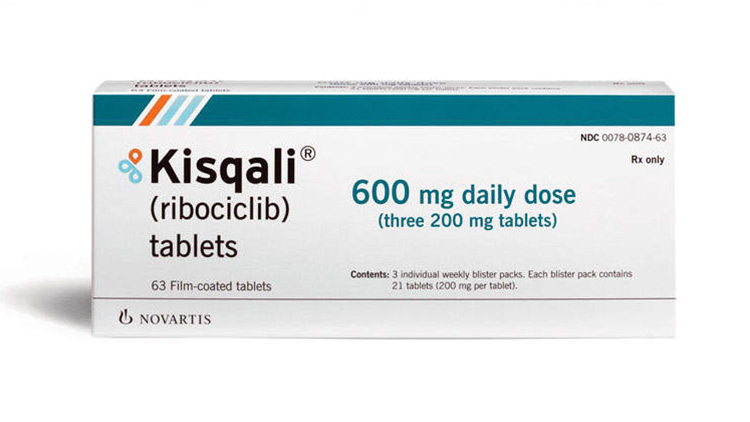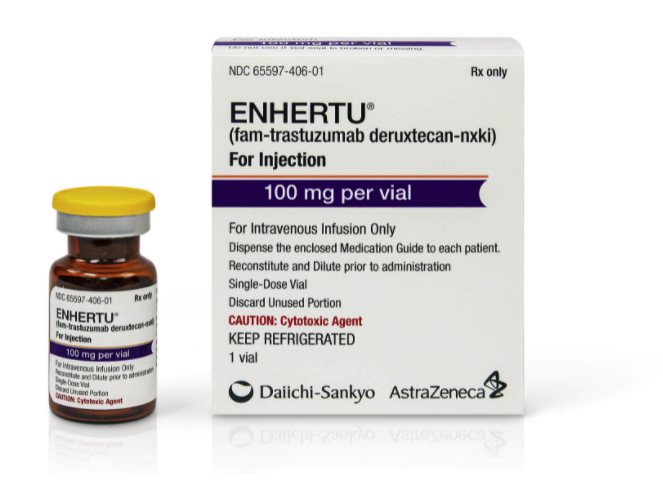Kisqali (ribociclib) vs Enhertu (fam-trastuzumab deruxtecan-nxki)
Kisqali (ribociclib) vs Enhertu (fam-trastuzumab deruxtecan-nxki)
Kisqali (ribociclib) is a CDK4/6 inhibitor used in combination with an aromatase inhibitor for the treatment of pre/perimenopausal or postmenopausal women, as well as in men, with hormone receptor-positive, human epidermal growth factor receptor 2 negative (HR+/HER2-) advanced or metastatic breast cancer. Enhertu (fam-trastuzumab deruxtecan-nxki) is an antibody-drug conjugate specifically indicated for the treatment of adult patients with unresectable or metastatic HER2-positive breast cancer who have received two or more prior anti-HER2-based regimens in the metastatic setting. The choice between Kisqali and Enhertu would depend on the patient's specific breast cancer characteristics, such as hormone receptor and HER2 status, previous treatments, and overall health, which should be discussed with a healthcare provider.
Difference between Kisqali and Enhertu
| Metric | Kisqali (ribociclib) | Enhertu (fam-trastuzumab deruxtecan-nxki) |
|---|---|---|
| Generic name | Ribociclib | Fam-trastuzumab deruxtecan-nxki |
| Indications | Hormone receptor-positive, HER2-negative advanced or metastatic breast cancer | HER2-positive breast cancer, HER2-positive gastric cancer |
| Mechanism of action | CDK4/6 inhibitor | HER2-directed antibody and topoisomerase inhibitor conjugate |
| Brand names | Kisqali | Enhertu |
| Administrative route | Oral | Intravenous |
| Side effects | Neutropenia, nausea, infections, fatigue, diarrhea | Nausea, fatigue, vomiting, alopecia, constipation |
| Contraindications | Hypersensitivity to ribociclib or any of its components | Hypersensitivity to fam-trastuzumab deruxtecan-nxki or any of its components |
| Drug class | Antineoplastic agent | Antibody-drug conjugate |
| Manufacturer | Novartis Pharmaceuticals Corporation | Daiichi Sankyo Company, Limited and AstraZeneca |
Efficacy
Efficacy of Kisqali (ribociclib) in Breast Cancer
Kisqali (ribociclib) is a targeted therapy drug used in the treatment of breast cancer. Specifically, it is a CDK4/6 inhibitor that works by interfering with the proliferation of cancer cells. Clinical trials have demonstrated the efficacy of Kisqali in combination with an aromatase inhibitor as a first-line treatment for hormone receptor-positive, human epidermal growth factor receptor 2-negative (HR+/HER2-) advanced or metastatic breast cancer. The addition of Kisqali to standard endocrine therapy has been shown to significantly improve progression-free survival compared to endocrine therapy alone. This improvement in survival rates represents a significant advancement in the treatment of this subset of breast cancer patients.
Efficacy of Enhertu (fam-trastuzumab deruxtecan-nxki) in Breast Cancer
Enhertu (fam-trastuzumab deruxtecan-nxki) is an antibody-drug conjugate that targets HER2-positive breast cancer, a type of cancer that tests positive for human epidermal growth factor receptor 2 (HER2), which promotes the growth of cancer cells. In a pivotal phase II trial, Enhertu has shown substantial efficacy in patients with HER2-positive metastatic breast cancer who had previously received two or more anti-HER2 therapies. The trial results indicated a significant response rate with a notable number of patients achieving tumor shrinkage. This has led to the approval of Enhertu for the treatment of adult patients with unresectable or metastatic HER2-positive breast cancer who have received two or more prior anti-HER2-based regimens in the metastatic setting.
In summary, both Kisqali and Enhertu have shown significant efficacy in the treatment of different subsets of breast cancer. Kisqali's role in improving outcomes for HR+/HER2- breast cancer patients and Enhertu's effectiveness in treating HER2-positive cases illustrate the advancements in targeted therapies for breast cancer. These medications offer hope for improved survival and quality of life for patients battling this disease. As with all medications, the efficacy of Kisqali and Enhertu should be evaluated on an individual basis, taking into account the specific characteristics of the patient's cancer and their overall health.
It is important for healthcare providers to stay informed about the latest clinical trial data and treatment guidelines to ensure that patients receive the most effective and appropriate care for their breast cancer. The use of Kisqali and Enhertu represents a tailored approach to cancer treatment, which is a cornerstone of modern oncology. Ongoing research and clinical trials continue to refine the use of these drugs and expand our understanding of their role in breast cancer therapy.
Regulatory Agency Approvals
Kisqali
-
European Medical Agency (EMA), European Union

-
Food and Drug Administration (FDA), USA

-
Health Canada

-
Therapeutic Goods Administration (TGA), Australia

-
Medsafe (NZ)

Enhertu
-
European Medical Agency (EMA), European Union

-
Food and Drug Administration (FDA), USA

-
Pharmaceuticals and Medical Devices Agency (PMDA), Japan

Access Kisqali or Enhertu today
If Kisqali or Enhertu are not approved or available in your country (e.g. due to supply issues), you can access them via Everyone.org.
How it works

Make an enquiry
Choose the medicine you want to buy, answer a couple of questions, and upload your prescription to speed things up. We’ll get back to you within 24 hours.


Make an enquiry
Choose the medicine you want to buy, answer a couple of questions, and upload your prescription to speed things up. We’ll get back to you within 24 hours.


Breeze through the paperwork
We'll guide you through the required documents for importing unapproved medicine, ensuring you have all the necessary information.


Get a personalized quote
We’ll prepare a quote for you, including medicine costs and any shipping, administrative, or import fees that may apply.


Receive your medicine
Accept the quote and we’ll handle the rest - sourcing and safely delivering your medicine.

Some text on this page has been automatically generated. Speak to your physician before you start a new treatment or medication.
Let's talk
If you have any questions, call us or send us a message through WhatsApp or email:
Contact us




